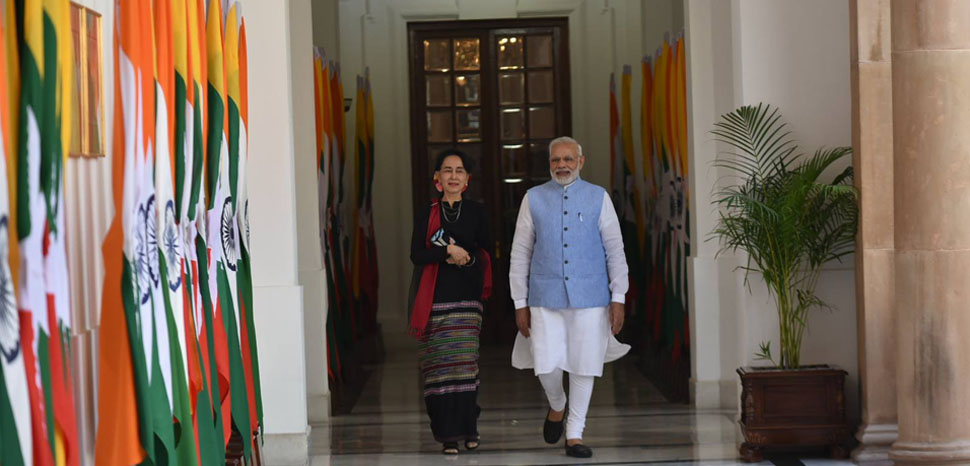
“It is not power that corrupts, but fear. Fear of losing power corrupts those who wield it and fear of the scourge of power corrupts those who are subject to it.”
-Aung San Suu Kyi in 1991.
Make no mistake: judging Aung San Suu Kyi in light of the above statement may be a bit difficult at present, particularly in the wake of the Myanmar army’s brutal suppression of the Rohingya community. The Noble Laureate first remained silent, then defended her country’s army in international fora. Even as condemnation of her stance poured out from different corners of the globe, India remained in a predicament. Suu Kyi is and will always remain dear to New Delhi; however, strategic interests demand that the Tatmadaw (as the Myanmar army is called) not be alienated.
The Noble Laureate’s present incarceration at the hands of the army is tragic. The history of democracy in South Asia will however vouch for Suu Kyi’s continued relevance to democratic movements around the world.
At this critical juncture, New Delhi is not so sure of itself. A few days back, India shied away from voting on a resolution in the United Nations General Assembly which condemned the military coup in Myanmar and called for a halt of arms sales to that country. The resolution and its timing are significant. They indicate that Suu Kyi is again winning over sympathies of the western hemisphere, which she had lost after her studied silence over Rohingya massacres. On the face of it, supporting the resolution was the only thing the Indian people could expect. But the corridors of power in New Delhi want to keep the Tatmadaw in good humor. Concern for security in India’s northeast is the primary reason. There are other factors too. But for decades, India has not been able to formulate a clear-cut Myanmar policy.
It is true that the Tatmadaw has cooperated with India in flushing out some northeastern Indian ultras from Burmese jungles. Last year, it had even deported quite a few cadres of the Peoples Liberation Army (PLA) of Manipur and United Liberation Front (ULFA) of Assam to India. It has also raided the jungle headquarters of the National Socialist Council of Nagalim (NSCN) – Khaplang faction in the northern Sagaing region.
But there is another side of the story. The Tatmadaw is known to be hard on the NSCN (Khaplang) group, but it is inexplicably soft on the other faction, NSCN (Issac-Muivah). For many years it has allowed the PLA, another secessionist organization of Manipur, to maintain bases in the Taka area near the Chindwin River. The reason is obvious. The Myanmar army does not want to lose all its cards, which can otherwise be played against India at some suitable point in the future.
For now, the Tatmadaw will maintain good working relations with India, because it is wary of Suu Kyi’s proximity to China, which developed in the wake of the Noble Laureate’s estrangement with Western countries. Another factor is Beijing’s open support to some ethnic Burmese insurgent armies operating in the north and northeastern part of Myanmar. In the past, Chinese army and air force units staged open shows of strength following Tatmadaw raids on several hideouts of the Kokangs, who are Mandarin-speaking Han Chinese. Even the Myanmar army has officially hinted that ethnic insurgents were ‘illegally’ getting arms from China.
It is not known how long Aung San Suu Kyi will be detained by the army. Some charges, whatever their worth, have been brought against her. It appears that she may have to spend a long time in prison unless intense international pressure forces the army to release her.
Now is the time for India to come out of her indecisiveness on the matter, as certain sections of Myanmar army are showing signs of restiveness. Already around 800 soldiers in various ranks have deserted the Tatmadaw. Moreover, there are reports that armies of ethnic insurgent groups like the Kachins, Karens, etc., are coming together to give a united fight against the Myanmar army on the issue of restoring democracy. These ethnic armies maintain good relations with the ultras of northeastern India, and on previous occasions provided safe corridors for Indian secessionist bands to reach China’s Yunnan Province. Being too soft on the Myanmar army might ultimately invite troubles for New Delhi, as it threatens to push ethnic Burmese insurgents toward the northeastern Indian ultras again.
In order to ensure the success of its Act East policy, New Delhi must chart out a meaningful and proactive Burma policy, not just a laid-back attitude to remain idle and casually watch developments in Yangon. This is what has been happening since the dethroning of U Nu, Burma’s democratically elected prime minister, by General Ne Win in 1962. Although U Nu was a great friend of Jawaharlal Nehru and concurred with the latter on almost every international issue, Nehru chose to remain silent keeping in mind two things – the long international border that India has with Burma, and the serious Naga insurgency. Although Aung San Suu Kyi has close personal relations with different layers of Indian society and its government, she has not received adequate support from India in her struggle for restoration of democracy in Burma.
New Delhi must remember that a democratic Myanmar will help strengthen democratic institutions and sentiments in large parts of northeastern India. There can be no better model than Aung San Suu Kyi in achieving this.
The views expressed in this article are those of the authors alone and do not necessarily reflect those of Geopoliticalmonitor.com
